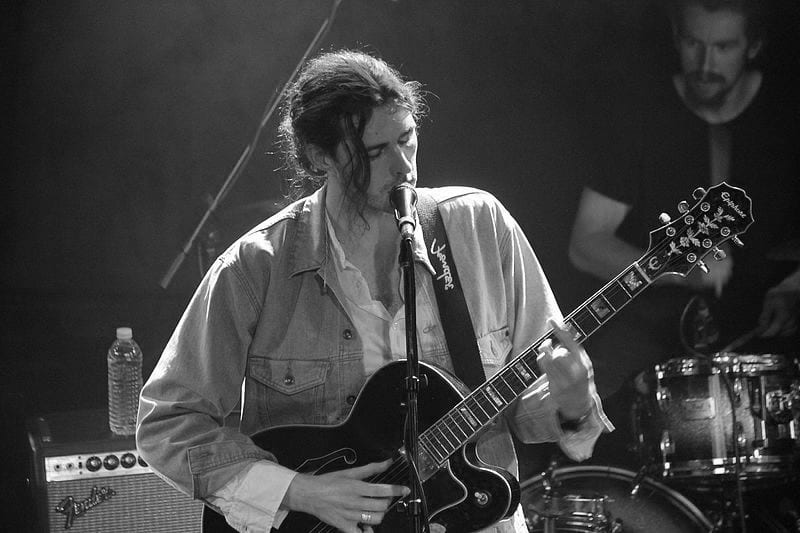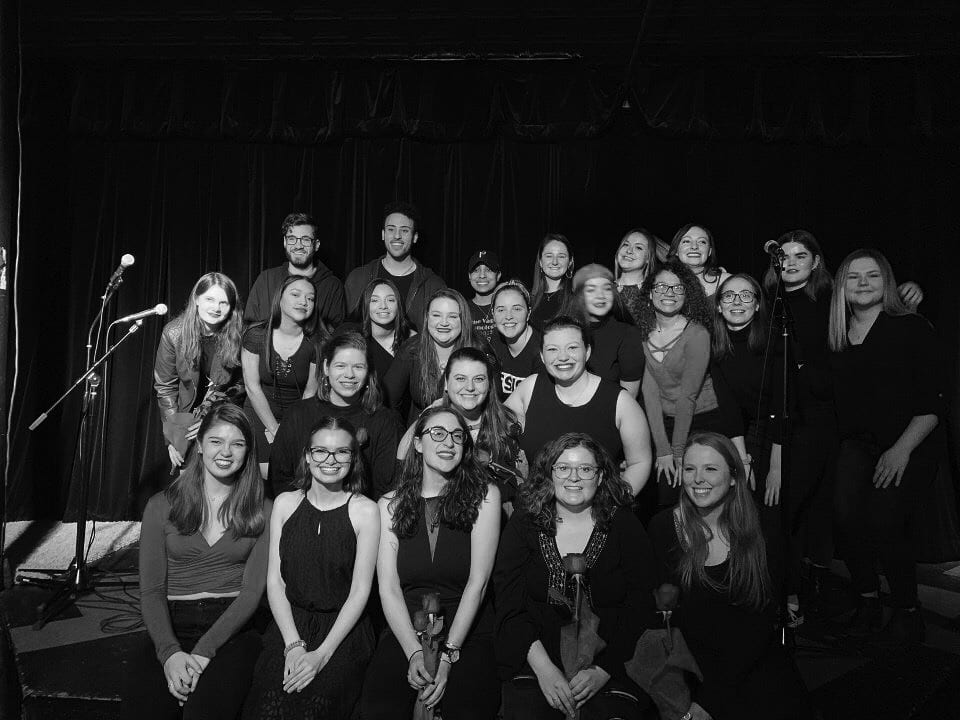Tag: Julia Vaccarella ’20
Moving Past the Legacy of ‘Take Me to Church’
by The Cowl Editor on March 7, 2019
Music
Hozier Releases New Album, Wasteland, Baby!
by Julia Vaccarella ’20 A&E Staff

Five years ago, Irish singer-songwriter, Andrew Hozier-Byrne released a debut self-titled album. Featuring the prominent track, “Take Me to Church,” the album propelled Hozier towards the popularity that he currently holds today in the United States. On March 1, Hozier released his second album, Wasteland, Baby!
Wasteland, Baby! consists of 14 songs which combine themes of destruction, hopelessness, and cynicism. Hozier finds a way to balance positive and negative emotions throughout the whole album and even within individual songs. Where there are sentiments of pain, those who can relate stand in solidarity with Hozier, and the same holds true for the more positive concepts on the album.
Hozier is generally associated with the alternative style; however, he has continually been praised for integrating other types of music such as jazz and blues into his music. The new record radiates elements of folk music as well, which has attracted many fans of alternative music looking for something slightly different.
Jonathan Bernstein of Rolling Stone said, “Wasteland, Baby! has enough encouraging displays of maturation to feel like a transitional moment for Hozier. At its best, the album carves out a space for the singer to work out his creative tensions as he finds new ways to make his straight folk influences more accessible without losing anything along the way.”
Moreover, Wasteland, Baby! contains only two songs that feature other artists. While some music critics argue that this is not sufficient, an advantage to having more individual songs is that listeners have more opportunities to focus on the artist themselves.
Mavis Staples makes an appearance on the first song of the album, “Nina Cried Power.” Hozier’s strong and recognizable voice comes to light within this track. The song focuses on the strength that can come from fighting for the good of society. Such a theme is unarguably fitting for a work by Hozier, who is a well-known advocate of a variety of social justice causes.
Hozier commented on “Nina Cried Power” to Apple Music: “The artists I’m singing about managed to define the times and how they experienced the world, and then, as a result, provided us with a document and legacy that lives forever. The intention was to be a thank-you note to that—and something that was undecidedly uncynical. I wanted to write something that spoke to the spirit of action in music.”
Many artists that dominate the charts today release multiple songs, or even albums, each year. With Hozier, it is evident that his intent goes beyond people buying and listening to his music. Rather, he aims to create something for his audience that will allow them to self-reflect. Wasteland, Baby! is a testament to this idea.
PC Students Stage and Star in The Vagina Monologues
by The Cowl Editor on February 28, 2019
Theater
by Julia Vaccarella ’20 A&E Staff

On Feb. 20 and Feb. 23, a group of Providence College students performed The Vagina Monologues (TVM) at AS220, a creative arts venue located in downtown Providence. This particular show is unlike many other traditional plays and theater productions. Based on the play by Tony award-winner Eve Ensler, TVM has been presented by a group of PC students for almost 20 years.
Since its debut in the 90s, TVM has been literarily translated into almost 50 languages throughout 140 countries. The Vagina Monologues and its content have also caused significant controversy over the years. However, at its core, TVM intends to raise awareness about issues surrounding violence against women. According to the TVM web site, “V-Day is a catalyst that promotes creative events to increase awareness, raise money, and revitalize the spirit of existing anti-violence organizations.”
Some of the monologues featured throughout the production by PC students this year incorporated humor, but TVM largely remains informative and serious in nature.
Although a significant amount of preparation, fundraising, and planning goes into putting on this show, TVM is one of the many outlets for students at the college to become more involved and meet new people with common interests.
Those who participate in TVM generally tend to resonate with its intent. Tori Rasmussen ’20 said, “The main reason that I decided to be a part of The Vagina Monologues was due to the mission of the show, but I also thought that performing in it would be something fun to be a part of.” In addition to the general cast and crew, TVM also has an executive board comprised of five members.
This year’s presentation of TVM ran at approximately two hours. All of the proceeds generated from the show on both days were donated to Sojourner House, a non-profit company that is based in Providence. This particular organization is relevant to the essential mission and purpose of The Vagina Monologues. Sojourner House is a resource and advocacy center for victims of domestic violence which relies heavily upon trained volunteers who offer a variety of educational, preventive, and supportive programs for victims and survivors alike.
The central themes of TVM are certainly relevant to college students. “PC students have performed The Vagina Monologues for 17 years, the past 14 of which it has been banned from campus, to express our dedication to ending violence against women. This issue is particularly important on a college campus, where the rate of sexual assault is extremely high,” said Maggie Bouvier ’19.
The forward nature of TVM confronts these topics head-on by exposing audiences to stories that are still largely taboo, even in today’s progressive society. In the midst of the #MeToo Movement, now is a fitting time to spread awareness about the various issues that plague millions each and every day.
Will Ferrell Reprises Role in The Ron Burgundy Podcast
by The Cowl Editor on February 14, 2019
Podcast
by Julia Vaccarella ’20 A&E Staff
The concept of the true crime podcast is one that is currently thriving. A twist on the traditional notion of this is now available from an unlikely source, with Will Ferrell reprising his role in the Anchorman series in the recently released The Ron Burgundy Podcast. The first episode of the show, titled “True Crime,” came out on Feb. 7.

It has been established that the show will not be featuring true crime during every episode. The podcast description states, “Each episode has a different theme in which Ron engages in conversation with another notable person on the topic at hand. In true Ron Burgundy fashion, these conversations have a tendency to go off the rails…” Many podcasts operate this way, as it allows the host/hosts to engage in a much broader range of discussion. This is particularly fitting for the character of Ron Burgundy, who likely has the ability to provide some kind of commentary on almost any topic.
Based on the Anchorman films, it seems that no other characters besides Ferrell as Ron Burgundy will be present, but it may be too early to say whether this is definitely true. The films are most commonly attributed to a 1970s setting, but it seems to be that the podcast takes place in the current time. The initial episode features a discussion of Lady Gaga, alternatively called “Lady Goo Goo,” in a subtle pop culture reference to the film A Star is Born.
The persona of Ron Burgundy, who begins the show seemingly unaware of what a podcast actually is, does seem to know that the most popular kind of podcast is indeed true crime. As a result, the focus shifts to this format later on in the episode. The use of the running joke that casts Texas Senator Ted Cruz as the Zodiac Killer is featured prominently, as it is alluded to as something that many listeners would be familiar with.
One downside to the podcast format of the Ron Burgundy revival is that the character is a news broadcaster. It is precisely his lack of awareness and understanding of what is going on that made the character worthwhile to watch in the Anchorman series. With The Ron Burgundy Podcast, we are able to hear Will Ferrell bring about this sense of confusion, but it is more effective as a visual approach within the films.
“So far, The Ron Burgundy Podcast is set entirely in a recording studio and, while Will Ferrell as Ron Burgundy is clearly the protagonist, the only stakes involved are in Ron’s nervousness at putting on a good show. Also, it is not very similar in structure to many television shows or movies playing out instead without interruption in the style of a morning radio program,” writes Joshua Dudley of Forbes. Going forward, it will be interesting to see which guests are featured and how they will play into bringing out Ron Burgundy as a character.
Weezer’s Teal Album
by The Cowl Editor on February 7, 2019
Music
by Julia Vaccarella ’20 A&E Staff

Last year, alternative rock band Weezer released a cover of Toto’s notorious hit song, “Africa.” On Jan. 24, the group released a full-length album consisting entirely of cover songs. The collection, self-titled, but also referred to as the Teal Album, is Weezer’s 12th studio release, coming a few months before their previously announced album release, which has been set for March 2019.
Some listeners may be quick to dismiss the Teal Album solely because it does not present any distinctly new material. However, Weezer does take a variety of popular songs from different genres and inevitably rework them to fit the band’s unique sound. Tracks range from TLC’s “No Scrubs” to “Everybody Wants to Rule the World” by Tears for Fears.
In fact, “Weezer is on track to notch its ninth top 10 album on the Billboard 200 chart, according to industry forecasters, with the rock band’s latest self-titled release, also known as the Teal Album,” as stated in a recent article by Billboard. This anticipated success could be largely due to the fact that many of the Teal Album’s featured songs were big hits themselves.
At the same time, however, the unannounced nature of the album leads to a deeper discussion about Weezer’s current place as a band, as the group’s original debut took place more than 20 years ago. Considering this, it is certain that there are a wide range of older Weezer fans willing to listen to ’80s hits, such as Michael Jackson’s “Billie Jean,” with eager nostalgia. The band also has a younger following who are looking for the same thing and may not even know it.
The Teal Album delivers on the ‘80s nostalgia to some extent but lacks any standout originality derived from Weezer’s alternative rock sound. Craig Jenkins of Vulture sums up this sentiment perfectly by saying, “Teal’s focus on joke covers of big ’80s hits feels like a missed opportunity to teach the listener more about the band’s beginnings. But the purpose of the endeavor isn’t to teach us about the band. It’s to keep us talking about the band.”
Weezer received a significant amount of criticism for its last project, “Pacific Daydream.” Although the record still did well, the album greatly detracted from some of the band’s earlier releases. Teal is a continuation of this, and the album can be seen as a grand way to bring about a discussion of the band as the date of their next release draws closer.
It is clear that Weezer has established itself as a constant in the alternative rock space over time, generating a dedicated fan base. The Teal Album is a testament to how far the band can go with the ability to garner support. Weezer, however, still has the creativity to release its own music, and hopefully their impending release, The Black Album, will do just that.
A Musical Enigma: James Blake Assume(s) Form
by The Cowl Editor on January 31, 2019
Arts & Entertainment
Mysterious British Singer Allies with Travis Scott, Metro Boomin for New Album
by Julia Vaccarella ’20 A&E Staff

English singer James Blake released his fourth record entitled Assume Form on Jan. 18. As is the case with many artists today, Blake’s work spans a multitude of genres. Historically, his earlier songs consisted of an upbeat sound heavily associated with house music. Although iTunes categorizes Assume Form as electronica, Blake takes a slower, more melodic approach to the 12 overall tracks which comprise the album.
However, versatility is sometimes necessary. Assume Form is a prime example of the various ways in which Blake excels at individualizing his sound. The record includes several tracks with R&B influences, offering features from Travis Scott to Metro Boomin. This genre is not new for Blake, who has worked with artists like Chance the Rapper and was also a part of the song “King’s Dead,” a project featured on the album curated for Black Panther.
Blake’s incorporation of pop songs has been criticized to some extent. This is because the most memorable aspects of the album are the tracks where Blake takes the spotlight. Craig Jenkins of Vulture says, “Assume Form is an exercise in dropping Blake’s aloof veneer, in writing songs that tell stories, where they preferred to serve puzzles.”
In fact, this is exactly how many individuals perceive James Blake—if they have even heard of him. Despite his contributions to other well-known projects, he still remains largely under the radar in the U.S. However, he has reached critical acclaim throughout the United Kingdom, debuting Assume Form in the top 10 on the British charts. Therefore, the experimentation in his work may be a way to entice individuals who listen to some of the more prevalent genres of music in the United States.
The main purpose of Assume Form is certainly not as superficial as Blake’s approach might seem, as illustrated by “Into the Red.” The record is highly personal and highlights a variety of themes ranging from insomnia, to self-doubt, to love. Blake says of the album’s title track, “Assume Form,” “… The plan is to become reachable, to assume material form, to leave my head and join the world. It seems like a quite modern, Western idea that you just get lost…” Considering the multi-layered elements of personality that Blake has incorporated into his work, integrating what he is experiencing in reality is essential to Assume Form.
Since his previous album, The Colour in Anything, Blake moved to the United States, fell into a new relationship, and grew older. The closing track on Assume Form, “Lullaby for My Insomniac,” is a testament to Blake’s altered sound, written as a calming tune to soothe its listeners to sleep. It is evident that much has changed, but the new release is more than mere symbolism for Blake. It is an active step forward, proceeding with hope.
More Than a Social Media Platform: Facebook Releases Podcast 3.5 Degrees
by The Cowl Editor on January 24, 2019
Arts & Entertainment
by: Julia Vaccarella ’20 A&E Staff
Facebook is most commonly known as a social media platform. Among others like Instagram and Snapchat, it enables users to connect with others through text, photographs, and other related media. However, the company has recently curated a new podcast series entitled 3.5 Degrees: The Power of Connection.
The title of the podcast is a play on the Six Degrees of Separation Theory, which asserts that humans are within merely six steps of one another at any given moment. With the accessibility of technology available in the market today, making connections and communicating with others is now easier than ever before. The theory is now extending further, essentially prompting a shift from six degrees of separation to 3.5.

According to Facebook Business Manager, 3.5 Degrees “explores the benefits, opportunities, and challenges of this new proximity; bringing together unexpected pairings of business leaders, mavericks, and entrepreneurs who share surprising parallels in values, visions, experiences and ideas.”
David Fischer, vice president of business marketing & partnerships at Facebook, serves as the host of 3.5 Degrees, which aired its first official episode on October 8, 2018. Fischer takes the theory of 3.5 degrees even further, formulating a discussion on the impacts of social media and technology with businesses and entrepreneurs. Although many listeners would assume that Facebook intended to use this tool as a marketing instrument, the discourse from the first episode does not come off this way. Fischer starts by introducing the respective backgrounds of his guests and then concludes by inviting them in to speak together.
The first episode of the podcast features the creators of two entirely different companies—Two Blind Brothers and TOMS—that have the like-minded purpose of helping others in need. TOMS is widely known for its mission to donate a pair of shoes for every purchase made to impoverished individuals in countries all over the world. Likewise, Two Blind Brothers’ founders, Bryan and Bradford Manning, have created a brand of clothing that focuses on textural rather than visual appeal; a portion of their profits are directed towards causes that seek a cure for blindness.
Introducing this topic as the lead-in for the podcast therefore makes 3.5 Degrees different than one would expect. From a discussion on the impact of social media and interconnectivity, it is evident that the progression of technology has made communication easier. What appears to be different about this series is that Fischer simply alludes to these assumptions rather than basing the overall discussion on them.
During the episode, Fischer says, “their conversation comes at a time when many companies are wrestling with how to give back, how to build social value, and how to attract the next generation of consumers who want to support businesses with altruistic goals.” Corporate social responsibility is a pervasive topic in the business world today, as many consumers value businesses that are looking to do more than generate a profit and reap personal gains. With the omnipresent sense of connection that can be felt today, this topic is fitting for the podcast’s larger aim. It will be interesting to see which angle Fischer takes next in the coming episodes.
Bandersnatch: A Revolution in Entertainment
by The Cowl Editor on January 17, 2019
Arts & Entertainment
New Black Mirror Project Polarizing for Loyal Fans

Technology comes with countless possibilities and the anthology series, Black Mirror, has taken the simultaneous hope and angst associated with this and expanded it further. The show, which is now streaming its episodes through Netflix, highlights some of the pitfalls of human dependence on new, often hypothetical, innovations. The series’ creators have taken this to a new level by directly incorporating viewers into the experience.
On December 28, 2018 Black Mirror: Bandersnatch was released as a standalone film. Contrary to the highly futuristic episodes released prior, Bandersnatch takes place in the 1980s, an interesting time frame for a show that relies significantly on the use of technology. Unlike the past episodes in the series, Bandersnatch prompts its viewers to choose from a selection of options throughout its duration.
Two choices appear on the screen at certain points during the film. Selecting a particular option, including one that seems trivial, may ultimately result in a different or altered outcome for the characters within the movie. In the event of deciding “wrong,” the viewer is taken back and given the option to choose the alternative. The plot also parallels the interactive feature, as the main character, Stefan, is in the process of creating a “choose-your-own adventure” video game.
While there are different endings to the same initial story, certain aspects of the plot are consistent. The integral role that the viewer possesses in watching the film alludes to the theme of choice—the debate between whether or not the characters, and essentially any individual, has the ability to control what happens to them. Bandersnatch also hints at the illusion associated with free will, insomuch that Stefan’s video game is designed to make its players feel that they are choosing for themselves. In reality though, he declares that he alone will control the ending, and the same holds true for the film itself.
The focus of Bandersnatch is less concentrated on the plot, and instead relies on the fact that there are multiple endings to the single story. A Rolling Stone review of the film sums up the process by explaining, “How you get to any of those climaxes involves an endless number of tangents, detours, alternate routes, and cluttered side streets. If you exceed the 10-second limit, or suffer from the paralysis of indecision, Netflix picks for you.” Fans who tend to stream content on their televisions have expressed dissent with the inability to watch Bandersnatch in this manner.
The varied storylines of the film have been a major topic of discussion amongst critics and fans alike. Because choosing different options can change the story, some have argued that the interactive component makes Bandersnatch too time-consuming. Although the storyline and length of the film have been somewhat criticized by long-time Black Mirror fans who were expecting more, the new element of interactivity does elicit a beam of hope for what is still to come for the series going forward.
Imagine Dragons Evolve From Their Origins
by The Cowl Editor on December 6, 2018
Arts & Entertainment
by: Julia Vaccarella ’20 A&E Staff

Nevada-based rock band Imagine Dragons has released a new album titled Origins, a decision which many fans have questioned, considering that it has only been a little over a year since the group’s last album release. Evolve, which debuted in late June 2017 and included the popular track “Believer,” certainly increased the band’s popularity, as they experimented with different genres. However, many long-time fans are now questioning whether Imagine Dragons is trying to distance themselves from their alternative-rock sound that originally defined them.
Origins delves deeper into different genres than Evolve, which is in large part still heavily rooted in an alternative style. The new record makes multiple attempts to integrate electronic beats into lead singer Dan Reynolds’s powerful and unique vocals. Ultimately, the seemingly diverse mix of songs jumbled together in Origins has caused disappointment and confusion among listeners. Moreover, many fans have questioned the band’s intent.
There are two main points to consider regarding the way Imagine Dragons has approached its new record and the timing of its release. The first is that the band, like many others, is aiming to become more accessible to listeners who may not be as deeply ingrained in rock and/or alternative music. They have done so chiefly by adding more of a pop sound to their music and releasing Origins so soon after their last record. Secondly, it is also just as likely that Imagine Dragons is trying to evolve from the style of music that they started their career with.
Despite this, it is almost certain that Imagine Dragons will still do well with Origins. Even several weeks after its release, the album still remains in the top 20 of the Billboard 200 charts. Although Imagine Dragons’ shift away from rock has upset some listeners, it is likely that the band will continue to thrive.They have shattered multiple records over the years and emerged in the spotlight with little effort or publicity.
As to be expected, many critics have commented on Origins and what the album means for Imagine Dragons going forward. The Guardian has offered commentary on the band members’ rationale for Origins, asserting, “Perhaps it all hints at a gulf between how Imagine Dragons see themselves—fearless sonic explorers and sociopolitical philosophers straining at the very confines of commerciality—and what they are: a band who’ve hit on a winning formula, where mainstream pop music is larded with just enough references to classic rock to lure in not just lovers of the Top 40, but the kind of people who normally sniff at mainstream pop.”
The fact that some listeners are eager to appreciate anything that Imagine Dragons put out is a testament to what the band has done over the years and who they are musically. While it is sometimes necessary to grow and experiment, many fans are still hopeful that Imagine Dragons will stick to what they do best, rather than deviating from rock and alternative music altogether.
Bohemian Rhapsody Film Offers Biographical Insight Into Queen
by The Cowl Editor on November 29, 2018
Arts & Entertainment

by Julia Vaccarella ’20
A&E Staff
It is no question that many of the songs and albums created by the members of the renowned British rock group, Queen, continue to enrapture many listeners to this day. Therefore, it comes as no surprise that the film, Bohemian Rhapsody, which chronicles the band’s major milestones and highlights the life of lead singer Freddie Mercury, has made such an impact on the box office following its Nov. 2 release. Starring Rami Malek, the movie is strongly guided by biographical events, culminating with Queen’s performance at the Live Aid concert in the year 1985.
Many critics have positively commented on Bohemian Rhapsody’s lead performance, with Malek as Freddie Mercury. While the movie ultimately provides an adequate picture of Queen’s rise to prominence, a significant focus is placed on aspects of Mercury’s personal life. Rolling Stone says, “And there is Malek, who digs so deep into the role that we can’t believe we’re not watching the real thing, starting from the singer and actor sharing an immigrant experience (the actor’s parents are from Egypt, Mercury’s from Zanzibar).”
In fact, it is revealed that Freddie Mercury was born with the name Farrokh Bulsara, but he opted to legally change his name thereafter. The movie goes far beyond delving into his family life, though. Bohemian Rhapsody also provides a picture of Mercury’s personal struggles, and how he chose to handle such issues whilst being in the spotlight.
As to be expected, much of the appeal for Bohemian Rhapsody has come from its interpretation of Queen’s music. For example, the film narrows in on the band’s innovative sound while creating the Night at the Opera album, embracing the members’ persistence to utilize “Bohemian Rhapsody” as the album’s leading single during a time where music of the sort was never heard on radio stations. The film also incorporates Queen’s effort in working towards involving their audience more during concerts, namely with the song “We Will Rock You.”
The Wall Street Journal describes this dynamic perfectly. In a piece summarizing several film releases during the opening weekend of Bohemian Rhapsody, the newspaper affirms, “Malek’s ability to adopt the personality and essence of Freddie Mercury has been supported by both longtime fans of Queen and younger audiences that are eager to learn more about the band’s history.”
The height of Queen’s success has extended well past its formation in the 1970s. Furthermore, many individuals today are still familiar with a wide array of the band’s songs, from “Somebody to Love” to “Bohemian Rhapsody” itself. Bohemian Rhapsody attempts to offer viewers a personification of Queen’s music and the backstory of a band that will surely continue to have a long-lasting legacy going forward.
Thailand’s Rap Against Dictatorship Speaks Out Against the Government
by Kerry Torpey on November 15, 2018
Arts & Entertainment

by Julia Vaccarella ’20
A&E Staff
Film, television, and music, among the many other forms of entertainment, are most commonly associated with serving the purpose of providing something to listeners and audiences alike. People engage in these outlets to find joy, learn something new, or laugh; however, entertainment also has the ability to deliver powerful messages to anyone that is willing to listen. This is exactly the case with Rap Against Dictatorship, an international band that has recently gained immense traction.
As the name of the group may blatantly suggest, the members of this band utilize their music to speak out against the government in Thailand. Rap Against Dictatorship’s global popularity significantly increased with the release of a music video on YouTube. The entirety of the video is presented in black and white to further convey the seriousness of the powerful message at play: the condemnation of the government. James Hookway of the Wall Street Journal says, “The song, ’What My Country’s Got…,’ is the strongest evidence yet of the discontent building here against junta chief and prime minister Gen. Prayuth Chan-ocha, and it is the younger generation that is leading the way.” The music video for the song has surpassed 30 million views.
Their music is not that different from what is found on the rap charts of Billboard and iTunes in the United States, and the genre is becoming increasingly popular in Thailand. Rap Against Dictatorship has also been compared to a number of American rap artists.
Additionally, their intent is to spread awareness about their dissatisfaction with the government and to ultimately enact change with the assistance and increased knowledge of those listening—both in their native country and throughout the world. The use of the internet, namely YouTube and news platforms, has undoubtedly contributed to the growing number of individuals who are familiar with Rap Against Dictatorship and the issues they are trying to bring to light.
Unfortunately, this growing popularity could result in legal consequences for the band. Such vocal slander against the government has sounded alarms for legal officials in Thailand. This has created rumors that the members of Rap Against Dictatorship may be questioned for breaking the law. However, it is certainly possible that such statements are merely propaganda being issued by officials representing the government in an effort to thwart the band’s agenda.
One of the four members of Rap Against Dictatorship, Dechathorn Bumrungmuang, has asserted in an interview that, “We’re all OK. No one in our group has been directly contacted by anyone from the government. What the media reported worried us more than anything. Just the fact that the prime minister responded to us meant we got our message across to who we were targeting.”
Rap Against Dictatorship’s intent to criticize the prime minister of the nation and his associated military rule certainly poses risks. However, as history has shown, there can be a price to pay as a tradeoff for standing up for what you believe in.
